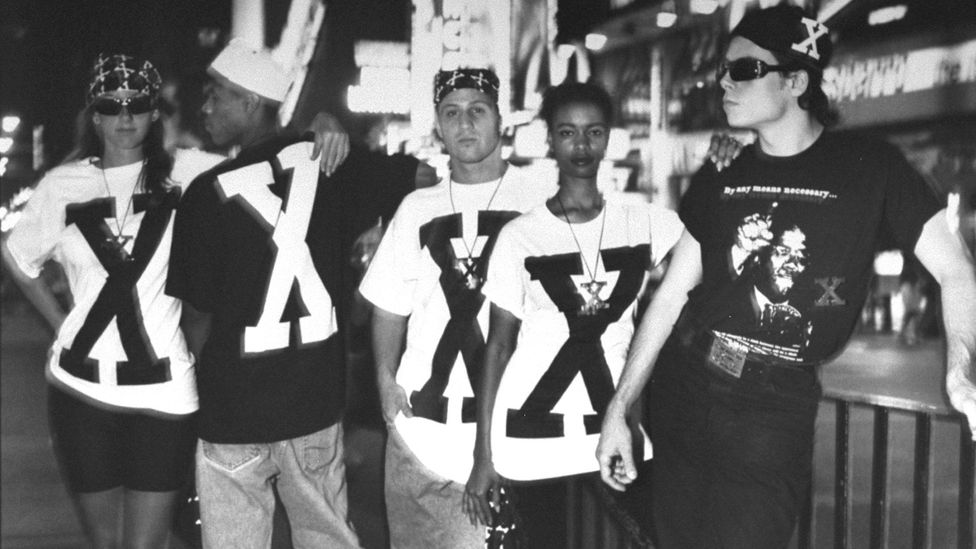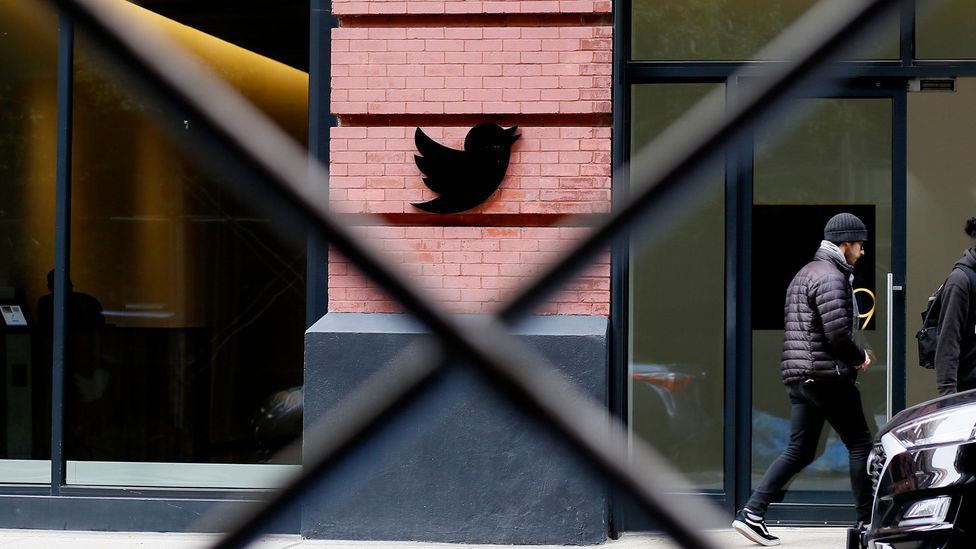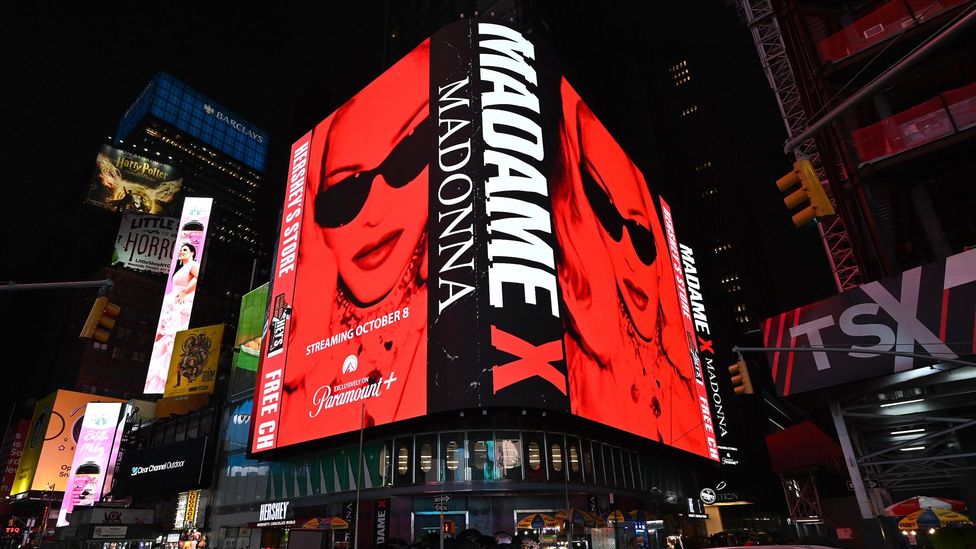(Image credit:
Getty Images
)

From its origins with the Phoenicians to Twitter’s rebrand, “x” is one of the English alphabet’s most powerful and alluring letters, writes Clare Thorp.
A
As letters of the alphabet go, there is one that punches well above its weight. Out of a total of 308,000 entries in the Oxford English Dictionary, just 366 words begin with the letter “x”, and very few of those make it into most people’s vocabulary. Yet despite this aloofness – or perhaps because of it – x is perhaps the most powerful and alluring letter we have.
More like this:
– The subtle ways language shapes us
– The surprising history of the word ‘dude’
– Have we murdered the apostrophe?
X-Files, X-Factor, X-Men, Generation X, X-rays, X-rated, Planet X… the letter is embraced in popular culture and by brands as shorthand for something unknown, futuristic or provocative. Its shape can signify everything from love (the kisses we use to sign off our emails and texts), to absence, prohibition and even death (as with the skull and crossbone). It’s impressive for a letter that Dr Samuel Johnson described in 1755’s Dictionary of the English Language as: “a letter which though found in Saxon words, begins no word in the English language.”

Elon Musk rebranded Twitter earlier in July (Credit: Getty Images)
This week, the 24th letter of the alphabet was thrust into the spotlight once again, as Elon Musk announced an abrupt rebrand of Twitter – the social media company he bought in October 2022 for $44bn. The site’s iconic blue bird logo is no more, replaced by a black letter X, part of Musk’s long-term plan to be a “platform that can deliver, well… everything.”
Musk says he chose x because it “embod[ies] the imperfections in us all that make us unique”. His fascination with it dates back over two decades, first evident in 1999 when he named his online banking service X.com, before it later evolved into PayPal. He bought the web domain back in 2017, claiming it had “great sentimental value.” He named an early Tesla car Model X, and his space exploration programme SpaceX. In 2020, Musk had a son with the musician Grimes, and the couple named him X Æ A-12 Musk.
There’s the implication of something important, unknowable and exciting – a symbol of possibility
The tech industry seems to have a particular fondness for the letter. Besides Musk’s X, there’s Microsoft’s gaming console Xbox, Sony’s Xperia smartphone, Apple’s iPhone X and operating system OS X. In 2010, Google chose the letter for the name of its secret idea-testing laboratory, first known as Google X and now simply X – its self-described “moonshot factory” for technologies that it claims will “improve the lives of million, even billions, of people”. There are reports that Meta – the Mark Zuckerberg-controlled parent company of Facebook, Instagram and Threads – has already trademarked an X logo for social media use, meaning there could be a trademark war ahead.
So why are the tech titans tussling it out for this one single letter, when there are 25 others they could draw on instead? Tony Thorne, Director of the Slang and New Language Archive at King’s College, London, sees it as an attempt to appear enigmatic, by invoking various vague scientific terms like exponential, experiential and experimental. “X is the only letter of the alphabet to not feature in many everyday words, but to also appear in multiple mathematical and technical contexts which baffle and intrigue most of us techno-illiterates,” he tells BBC Culture. There’s the implication of something important, unknowable and exciting – a symbol of possibility. For Thorne, though, its overuse is beginning to backfire. “Now it’s approaching a cliché.”
Part of the power of x is that it isn’t just a letter, it’s a symbol: one that humans have been making for millennia. “It’s such a primal designation act, x,” says Drucker. “In the earliest sign systems that humans make, crosses and circles are so fundamental because they’re so easy to make. We’ve got stones from France from 20,000 years ago that have crosses and circles on them.” From the Middle Ages, those who were illiterate used X as a signature.
Malleable meanings
The letter X has had a somewhat muddled history, perhaps contributing to its malleable meanings. It originally derives from a Phoenician letter called samekh, meaning fish, which was used to represent the sound “s”. “The Greeks borrowed it, called it ‘Chi’, used it for the ‘kh’ sound and wrote it as a diagonal cross,” explains Thorne. The Romans later adopted the x sound from the Chalcidian alphabet, a Western variant of the Greek alphabet, and combined it with the Chi (x) symbol and x as we know it today was born. It’s also one of seven letters used in the Roman numerical system.
The letter’s air of mystery came relatively late. “Part of the mystique of x comes from algebra, where it stands for the unknown that has to be solved,” says Drucker. “That comes with the whole rational, mathematical enlightenment.” In the 17th Century, Descartes designated the letters x, y and z to represent unknowns (with a, b and c as knowns). Out of these three letters, it is x that has emerged as the dominant symbol of mystery, conjuring the strange, the alien, the exotic.

As well as its meaning in algebra, the letter “x” has sexual connotations (Credit: Getty Images)
When German physicist Wilhelm Röntgen discovered a new kind of radiation in 1895, he called it an X-ray because its nature was unknown. To have the X-factor is to possess some intangible star quality. In sci-fi, x comes to represent something otherworldly, extraterrestrial. This ambiguity isn’t always positive. Think pieces on Generation X – those born between 1965 and 1980 – often described them as a lost, aimless generation.
The letter can also signify an absence or an erasure. The X in civil rights activist Malcolm X’s name stood for his unknown African name, taken from his ancestors during slavery. The Straight Edge punk movement – who abstain from alcohol, tobacco and drugs – use X as their identifier. Yet, at other times x symbolises a presence – x marks the spot; the x used to mark our choice on a ballot paper. It is a letter full of contradictions.
It also has a whiff of sexual danger. John Singer Sargent’s provocative painting Madame X, depicting an American woman known for her extra-marital affairs, scandalised late 19th-Century Paris. In 1951, the British Board of Film Censors introduced the X certificate to indicate a film was “extremely graphic.” Though this originally referred to violence and bad language as well as sex, “X-rated” was co-opted by the porn industry and is now shorthand for sexually explicit material.
Its association with the extreme seems apt for Elon Musk who, when he first bought Twitter, asked staff to commit to an “extremely hardcore” working culture.
The letter x doesn’t just have multiple meanings, but multiple pronunciations too – not ideal when you make it the centrepiece of your huge global brand. There’s confusion on what it might be called in Japan, where the term X Japan is already trademarked by a rock band.
It’s assumed Musk wants his X to be something akin to China’s WeChat, an app where users can communicate, consume news, make purchases, pay bills and even order a taxi. For an app that will offer such disparate services, it perhaps makes sense to use a symbol with so many meanings.
But the rebrand has got off to a bumpy and confusing start. Police arrived midway through the removal of the twitter sign from the company’s San Francisco headquarters, putting a halt to the “unauthorised work” and leaving just “er” hanging on the building. There is uncertainty about how we will talk about X, too. Will tweets now be Xs? The word “tweet” made it into the dictionary as a verb – what will the equivalent be?
“Because of its multiple potential, sometimes contradictory meanings, the X symbol at first sight will certainly strike many as mysterious, puzzling, perhaps intriguing, but should a brand be provoking uncertainty or confusion?” asks Thorne. The future of Musk’s X project is yet to be seen – but harnessing the power of this most beguiling and shape-shifting of letters might prove too much, even for the world’s richest man.
If you would like to comment on this story or anything else you have seen on BBC Culture, head over to our Facebook page or message us on Twitter.
And if you liked this story, sign up for the weekly bbc.com features newsletter, called The Essential List. A handpicked selection of stories from BBC Future, Culture, Worklife and Travel, delivered to your inbox every Friday.
;





